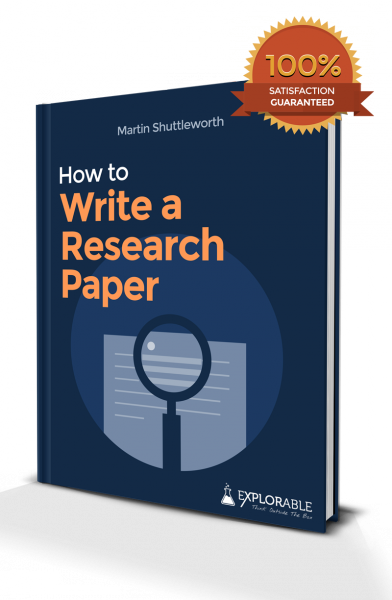- Home >
- Research Paper
Write a Research Paper
A Guide on How to Write Academic Papers
A Guide on How to Write Academic Papers
This guide aims to help you write a research paper.
This article is a part of the guide:
Browse Full Outline
This guide contains an overview on writing academic papers such as the term paper, thesis, research paper or other academic essays written in the format of the research paper.
We have tried to integrate thoughts from the APA-format and the MLA-format.

General Overview
Many students wonder about the writing process itself. The outline of the academic paper is very similar for most branches of science.
Creating an extended outline may help structure your thoughts, especially for longer papers. Here are a few samples outlines for research papers.
We have also created a couple of articles with general tips and help on research papers.
When writing a scientific paper, you will need to adjust to the academic format. The APA writing style is one example of an academic standard frequently used.
By the way, here is another great resources on how to write a research paper.
Preparing to Write a Research Paper
Usually, the purpose of a research paper is known before writing it. It can be formulated as a research paper question, a thesis statement or a hypothesis statement.
If you do not know what to write about, you will have to look for ideas for research paper topics.
Structure of a Research Paper
The structure of a research paper might seem quite stiff, but it serves a purpose: It will help find information you are looking for easily and also help structure your thoughts and communication.
Here is an example of a research paper. Here's another sample research paper.
An empiric paper frequently follows this structure:
Additional Parts for Some Academic Papers
The following parts may be acceptable to include in some scientific standards, but may be inappropriate for other standards.
- Table of Contents (Usually placed right before or right after the abstract)
- Acknowledgments (Sometimes placed before the abstract and sometimes at the end of a paper)
- Appendices (Placement: After all the other parts)
Other Technical Issues
When correcting papers, we have been surprised by the many students struggling with intext citations. Although the standards are somewhat different, citations in the text should not be too difficult to master. The most used standards for referencing in research papers are APA-standard and MLA-standard.
Some paper formats allow you to include footnotes in the text, while some do not allow footnotes.
Authors frequently want to include tables and figures in the text.
Sometimes the format or standard prohibits the authors from entering tables and figures directly into the text (where you want your table). Sometimes they have to be included after the main text.
Standards and Formats
Please observe that most scientific fields (and paper formats) have their own specific rules and standards of writing.
You will have to check with your faculty or school to know exactly how to write the paper - the guide is meant as an overview of academic papers in general.
Publish Articles
Publication of your article can be a very time-consuming process.
After writing the academic paper, the researchers submit it to a journal. Typically you start with the most regarded journal and then work yourself down the list, until a journal accepts the article.
Scientific journals use peer review process, which is a panel of other researchers (most likely in the same field) who review the work, to ensure that the quality of the paper.
Publication bias is a well known phenomenon, as the peer review process often rejects "null results". A journal rejection does not necessarily mean that you do not have a chance to resubmit the journal though.
Check out our quiz-page with tests about:
Oskar Blakstad (Oct 4, 2008). Write a Research Paper. Retrieved Feb 24, 2026 from Explorable.com: https://explorable.com/write-a-research-paper
You Are Allowed To Copy The Text
The text in this article is licensed under the Creative Commons-License Attribution 4.0 International (CC BY 4.0).
This means you're free to copy, share and adapt any parts (or all) of the text in the article, as long as you give appropriate credit and provide a link/reference to this page.
That is it. You don't need our permission to copy the article; just include a link/reference back to this page. You can use it freely (with some kind of link), and we're also okay with people reprinting in publications like books, blogs, newsletters, course-material, papers, wikipedia and presentations (with clear attribution).
This article is a part of the guide:
Browse Full Outline
Footer bottom





